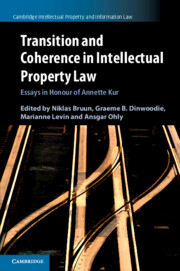Book contents
- Transition and Coherence in Intellectual Property Law
- Cambridge Intellectual Property and Information Law
- Transition and Coherence in Intellectual Property Law
- Copyright page
- Contents
- Preface
- Greetings to Annette Kur from the Second Floor
- Annette Kur: Toward Understanding
- Part I Transition
- Part II Coherence
- A Intellectual “Property” and its Limits
- 16 The (Lack of) Coherence of Data Ownership with the Intellectual Property System
- 17 The Threefold Fictitiousness of Intellectual Property
- 18 An Intellectual Property Structural Engineer Extraordinaire and Her Lifelong Quest for Coherence
- 19 Open Yet Secret – Trading of Tangible Goods and Trade Secrets
- 20 From Smörgåsbord to New Nordic Cuisine: EUHarmonization of Trade Secrets Protection in the Nordic Countries
- 21 Trade Mark Rights and Parallel Imports vis-à-vis the Never-Ending Evolution of the Behavior of Firms: Transition and Coherence Put to a Test
- 22 Legal Concept of “Exhaustion”: Exhausted?
- 23 Building Coherence in Technological Transitions: Putting Exploitation at the Core of IP
- 24 “Accessory Exhaustion” – and Use of a Work as a Work
- B IP Overlaps
- C (Un-)fairness
- Conclusion
- Cambridge Intellectual Property and Information Law
24 - “Accessory Exhaustion” – and Use of a Work as a Work
from A - Intellectual “Property” and its Limits
Published online by Cambridge University Press: 29 December 2020
- Transition and Coherence in Intellectual Property Law
- Cambridge Intellectual Property and Information Law
- Transition and Coherence in Intellectual Property Law
- Copyright page
- Contents
- Preface
- Greetings to Annette Kur from the Second Floor
- Annette Kur: Toward Understanding
- Part I Transition
- Part II Coherence
- A Intellectual “Property” and its Limits
- 16 The (Lack of) Coherence of Data Ownership with the Intellectual Property System
- 17 The Threefold Fictitiousness of Intellectual Property
- 18 An Intellectual Property Structural Engineer Extraordinaire and Her Lifelong Quest for Coherence
- 19 Open Yet Secret – Trading of Tangible Goods and Trade Secrets
- 20 From Smörgåsbord to New Nordic Cuisine: EUHarmonization of Trade Secrets Protection in the Nordic Countries
- 21 Trade Mark Rights and Parallel Imports vis-à-vis the Never-Ending Evolution of the Behavior of Firms: Transition and Coherence Put to a Test
- 22 Legal Concept of “Exhaustion”: Exhausted?
- 23 Building Coherence in Technological Transitions: Putting Exploitation at the Core of IP
- 24 “Accessory Exhaustion” – and Use of a Work as a Work
- B IP Overlaps
- C (Un-)fairness
- Conclusion
- Cambridge Intellectual Property and Information Law
Summary
The question of how to handle overlapping IP rights is central to Annette Kur’s scholarship. In addition to her unique overview of and deep insights into all disciplines of IP, she has always been concerned with fairness and balance in IP law. This is a concern that I share, and in the late 1990s, when I was working on finishing my doctoral dissertation on copyright exhaustion, I came to reflect on the interrelationship between the Dior/Evora decision of the Court of Justice of the European Union (CJEU) and the Astra decision of the European Free Trade Association (EFTA) Court.2 Although both the facts of and the reasoning in these two cases were quite different, the common feature of the decisions was the conclusion that the trade mark holder3 was unable to invoke copyright to ancillary material in order to prevent parallel imports of the goods. While reflecting on this, it hardly came as a surprise when Annette simultaneously published an article where she analyzed the trade mark/copyright interface under the viewpoint that the Dior/Evora decision in effect provided for the exhaustion of the copyright holder’s reproduction right,4 also making the link to the Astra decision of the EFTA Court.5 Her article inspired me to introduce the term “accessory exhaustion” to describe the non-application of copyright as an accessory to trade mark exhaustion.6
- Type
- Chapter
- Information
- Transition and Coherence in Intellectual Property LawEssays in Honour of Annette Kur, pp. 294 - 304Publisher: Cambridge University PressPrint publication year: 2021
- 1
- Cited by



